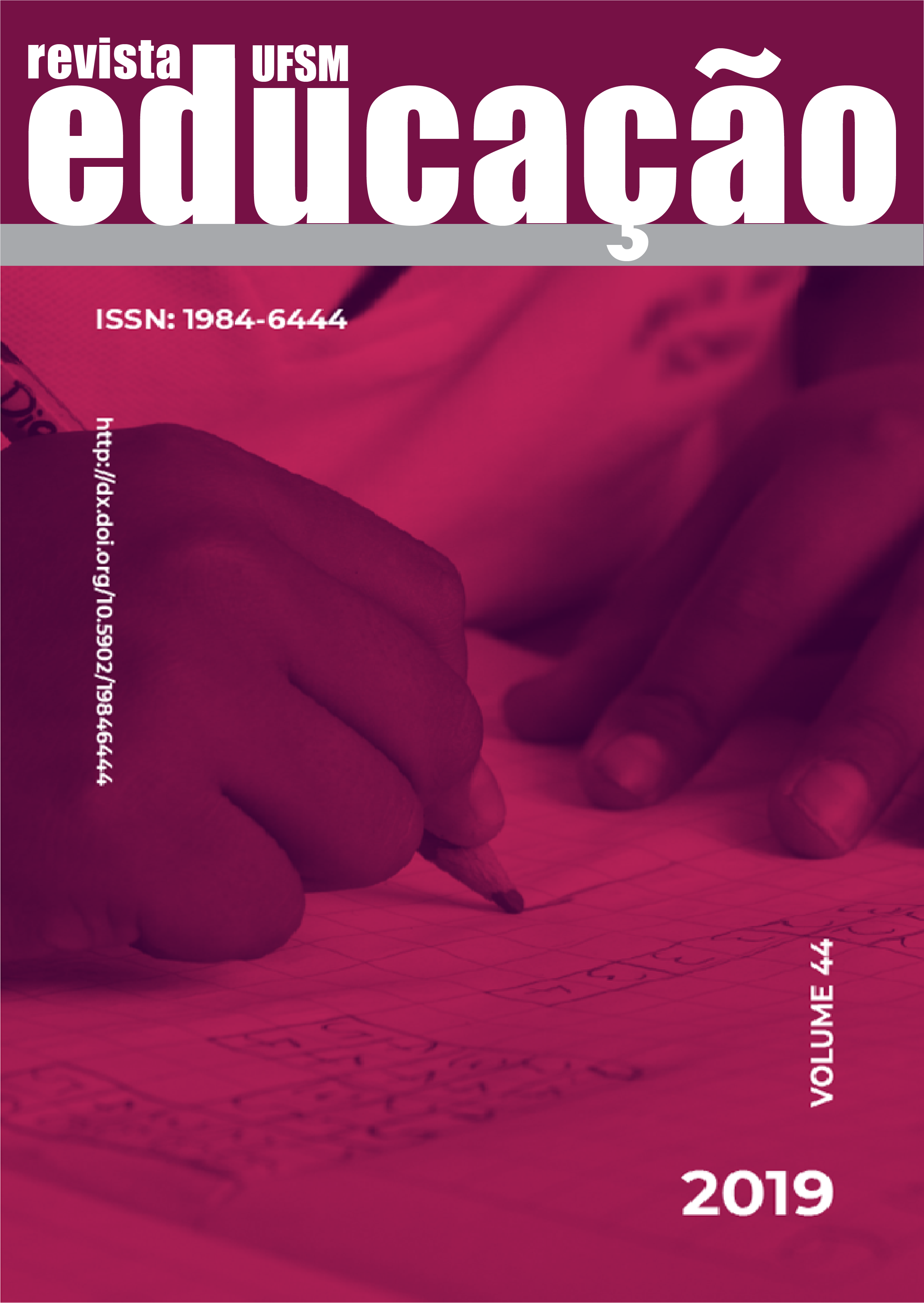The offering of bachelor’s degree enrollments and in-class courses in gaucho universities
DOI:
https://doi.org/10.5902/1984644428556Keywords:
Universities, Bachelor’s Degree, Rio Grande do Sul.Abstract
This article describes and problematize the offering of bachelor’s degree enrollments and courses, such as Pedagogy, Languages and Math, in the in-class modality, in public and private universities from the state of Rio Grande do Sul, in the southern region of Brazil, in the context of strong official pressure for expanding of Brazilian universities. Considering the importance of these courses of policies of evaluation and educational formation for primary education and the official policies of expansion of superior education since the end of the 1990’s, this study is justified by the absence of researches focused on the impact of these policies in the case of the state of Rio Grande do Sul. It was used a quantitative and qualitative methodology from the data of Censos da Educação Superior (2000, 2007 and 2013). The data are interpreted from studies focused on superior and teachers’ education. From the analysis, it is observed that there was a drop in the total number of enrollments, in the courses studied, during the period of 2007-2013. However, while the drop was pretty significant in private universities, the public universities kept a growing number of enrollment, due to the creation of new public universities in regions of the state uninhabited by the federal sphere and, yet, due to the expansion of offering of courses and public university vacancies already existent. It is also noticed the strong presence of private universities in the offering of courses studied, especially in the metropolitan region of the state, due to be a region of bigger economic development and population concentration. On the other hand, the public universities are innovating in the poorer and more remote regions of the state.References
BARRETO, Elba Siqueira de Sá. Políticas de formação docente para a educação básica o Brasil: embates contemporâneos. Revista Brasileira de Educação – RBE, v. 20, n. 62, jul/set, 2015.
BORGES, Maria Célia. A formação de professores nos projetos de expansão das universidades públicas: desafios e possibilidades. Revista e-Curriculum, v.13, n, 2, abr-jun, 2015. p. 252-279.
BRASIL. Congresso Nacional. Lei de Diretrizes e Bases da Educação Nacional: LDB 9394/96. Brasília: Congresso Nacional, 1996.
BRASIL. Instituto Nacional de Estudos e Pesquisas Educacionais Anísio Teixeira (INEP). Censo da Educação Superior. Disponível em: http://portal.inep.gov.br/web/censo-da-educacao-superior Acesso em: 20/03/ 2016.
BRASIL. Instituto Nacional de Estudos e Pesquisas Educacionais (INEP). Censo da educação superior – Microdados. Brasília: INEP/MEC. Disponível em: http://portal.inep.gov.br/microdados. Acesso em 07/09/2015.
BRASIL. Instituto Nacional de Estudos e Pesquisas Educacionais Anísio Teixeira (INEP). Censo da educação superior – Resumo Técnico. Brasília: INEP/MEC, 2010. Disponível em: http://portal.inep.gov.br/resumos-tecnicos1. Acesso em 10/10/2015.
BRASIL. Instituto Nacional de Estudos e Pesquisas Educacionais Anísio Teixeira (INEP). Censo da educação superior – Resumo Técnico. Brasília: INEP/MEC, 2016. Disponível em: http://portal.inep.gov.br/resumos-tecnicos1. Acesso em 10/10/2015.
BRASIL. Ministério da Educação. Diretrizes Gerais do Decreto nº 6.096 – Reuni – Reestruturação e expansão das universidades federais. Brasília, DF, 2007. Disponível em: http://portal.mec.gov/ br/sesu/arquivos/pdf/diretrizesreuni.pdf. Acesso em: 23/04/ 2016.
BRASIL. Ministério da Educação. A democratização e expansão da educação superior no país 2003 – 2014. Disponível em: http://portal.mec.gov.br/index.php?option=com_docman&view=download&alias=16762-balanco-social-sesu-2003-2014&Itemid=30192 Acesso em: 5/04/ 2016.
DOURADO, Luiz Fernandes e SANTOS, Catarina de Almeida. A educação a Distância no contexto atual e o PNE 2011-2020: avaliação e perspectivas. In: DOURADO, Luiz Fernandes (org.) Plano Nacional de Educação (2011-2020): avaliação e perspectivas. Goiânia: Editora UFG; Belo Horizonte: Autêntica Editora, 2011.
FANTINEL, Vinícius Dias. Participação das mesorregiões gaúchas no PIB do RS, entre 2010 e 2013. Revista Carta de Conjuntura FEE, ano 25, nº 02, 2016.
FREITAS, Helena Costa Lopes. PNE e formação de professores: contradições e desafios. Revista Retratos da Escola, Brasilia, v. 8, n. 15, p. 427-446, jul/dez, 2014. Disponível em: http://www.esforce.org.br/index.php/semestral/article/view/451 Acesso em: 12/02/2015.
GATTI, Bernardete Angelina; BARRETO, Elba Siqueira de Sá. Professores do Brasil: impasses e desafios. Brasília: UNESCO, 2009.
GATTI, Bernardete Angelina; BARRETO, Elba Siqueira de Sá; ANDRÉ, Marli Eliza Dalmazo de Afonso (p.119). Políticas docentes no Brasil: um estado da arte. Brasília: UNESCO, 2011.
MAGUIRE. Meg. Para uma sociologia do professor global. In: APPLE, Michael W.; BALL, Stephen J.; GANDIN, Luís Armando (orgs). Sociologia da Educação: análise internacional. Porto Alegre, Penso, 2013.
MAUÉS, Olgaíses Cabral e CAMARGO, Arlete Maria Monte de. A expansão do ensino superior , políticas de formação docente e atratividade da carreira. Revista Eletrônica de Educação, v. 8, n. 1, p.77-91, 2014. Disponível em: http://www.reveduc.ufscar.br/index.php/reveduc/article/view/1013 Acesso em: 09/11/2015.
ROSE, Nikolas. Governing "advanced" liberal democracies. In: BARRY, A; OSBORNE, T.; ROSE, N. (Ed.) Foucault and political reason: liberalism, neo-liberalism and rationalities of government. Chicago: The University Chicago Press, 1996. p.37-64.
Published
How to Cite
Issue
Section
License
Declaration of originality
We declare that all articles present in the journal Educação (UFSM) are originals and were not submitted for publishing on any other publication, as a whole or a fraction. We also declare that, after being published by Educação (UFSM), a paper will not be submitted to another journal within two years. After this time, our journal transfers the publishing rights to the authors, with a permit granted by the Editorial Council.
We also acknowledge that the originals’ submission to Educação (UFSM) implies on a transference of copyright for physical and digital publishing to the journal. In case of noncompliance, the violator will receive sanctions and penalties predicted by the Brazilian Copyright Protection Law (n. 9610, dated 19/02/98).
Attribution 4.0 International (CC BY 4.0)
This license lets others remix, transform, and build upon the material for any purpose, even commercially, and copy and redistribute the material in any medium or format.

This work is licensed under a Creative Commons Attribution 4.0 International (CC BY 4.0)






